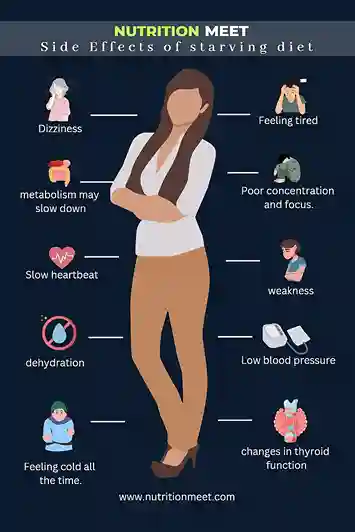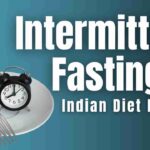Every human being has been following a regular diet since his childhood; Some were taught to eat right, and some were taught to eat whatever food they like as a taste of food, and processed food in the market is acting like a cherry on the cake, there is maximum packaged food heavy with added in sugar artificial flavor, which leads to more negative attacks on health in the long run. But today, we will know two popular words. First, what is intermittent fasting and a starvation diet, and what is the difference between intermittent fasting and starvation?

Starvation and intermittent fasting are very different practices that often confuse one another. While they may have some similarities, they are fundamentally different and impact the body differently.
Starvation
Is the practice of severely restricting food intake, often to the point where the body is not getting enough nutrients to sustain itself. During the long-term starvation cycle, the body starts drawing energy from tissues like muscle, adipose tissue, and bone, thereby changing body composition
[1]. Moreover, starvation can lead to various health issues, including malnutrition, refeeding syndrome, weight loss, fatigue, and even organ damage. In extreme cases, starvation can be deadly. Malnutrition is a condition in which an individual can get deprived of either energy or protein intake. [8]. On the contrary, refeeding syndrome is a situation in which, after prolog starvation, eating may put a person at risk of renal failure [9].

Intermittent fasting,
On the other hand, is a practice that involves periods of voluntary abstinence from food and caloric beverages, typically for a set number of hours or days. In short, it is a systematically organized eating pattern that is concerned with when you eat rather than what you eat [2]. For example, a person choosing for 16:8 type of intermittent fasting will fast for 16 hours in which the individual will intake only 25% of the total energy that is normally consumed, followed by 8 hours eating window wherein the person can eat a wide variety of nutritious food without any restriction and vice versa. In short, it is a systematically organized eating pattern that is concerned with when you eat rather than what you eat [2].

Intermittent fasting can be done for various reasons, including weight loss, and improved insulin sensitivity, especially in Type 2 diabetes patients, help in cancer treatment, and increased longevity.
One key difference between starvation and intermittent fasting is the purpose and duration of the fast. Starvation is either intentional but unorganized days of fasting with a certain type of food intake (generally liquid/juices) or unintentional, usually resulting from needing more access to food or resources [3]. Intermittent fasting, on the other hand, is typically a conscious decision and is done for specific periods with a specific duration of the eating window [4].
Another major difference is the impact on the body. While starvation can have serious adverse effects on the body, intermittent fasting has been shown to have several potential health benefits [5]. Some studies have suggested that intermittent fasting can help improve insulin sensitivity, lower blood pressure, and reduce the risk of certain diseases such as heart disease and cancer [6].
It’s important to note that intermittent fasting is not for everyone and may not be suitable for specific individuals, such as pregnant women, breastfeeding mothers, children, individuals with hormonal imbalances, and people with certain medical conditions [7]. Hence, before starting intermittent fasting, these risk-category people should take the advice of the healthcare profession and must do it under supervision.
At last, starvation and intermittent fasting are two very different practices that should not be confused with one another. Starvation is the practice of severely restricting food intake, which can negatively impact the body. At the same time, intermittent fasting is an organized way of eating, with no restriction on the intake of any kind of nutritious foods during the eating window. There are very few known health risks with intermittent fasting. Instead, it helps people to achieve their goal of a disease-free, healthy lifestyle.





